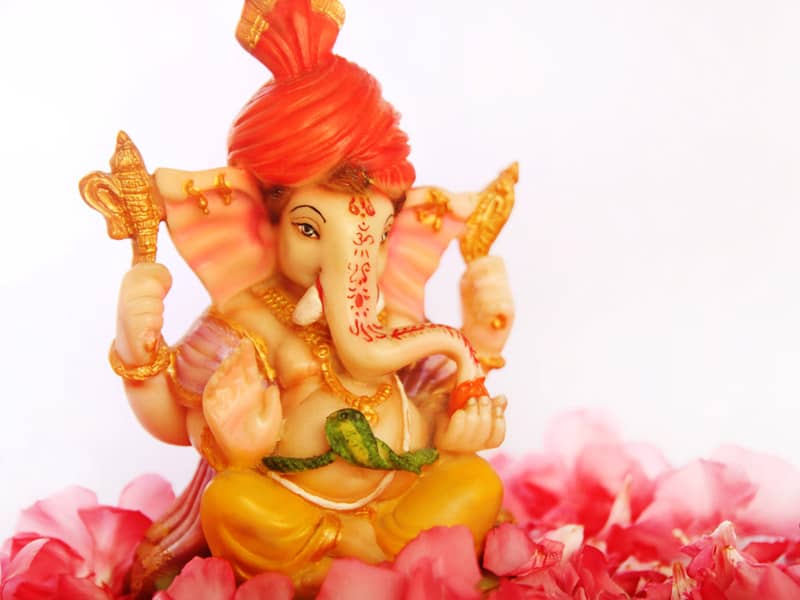The bracelets weren't always cheap, either. The thread bracelets were made of silk and cotton, and had a large charm in the middle. The more money you had, the larger and more garish the charm was. Some very rich kids even bought gold and silver bracelets. Irrespective of the price, some of them looked very nice.
Much as I was embarrassed to show my ignorance (everyone seemed to know what this was except me), I asked my classmates what was up. This was the Rakhi--bracelet--that sisters tied on their brothers' wrists on the holiday of Raksha Bandhan. Raksha Bandhan is celebrated on the full-moon day in the month of Sravana, which usually falls during July or August.
Assuming that rakhis were a different spin on the friendship bracelet fad, I bought one for my brother and figured I'd quickly present it to him. On Raksha Bandhan day, I went down to a friend's home to ask her about the details surrounding the bracelet: how to tie it, etc. Here I was in an old pair of shorts and T-shirt, ready to go and play once I'd taken a minute to tie the rakhi around my brother's wrist. Little did I understand the formality and emotion surrounding this beautiful festival.
To my surprise, I discovered that Raksha Bandhan was a very formal and beautiful affair. On the day, sisters dress up in colorful clothes and jewelry. Their brothers visit them on that day, if they no longer live in the same house with them. The girls then apply a "Tilak" [an auspicious mark made with paste or paint] on their brothers' foreheads and tie the Rakhi around the right wrist of their brothers, while chanting a mantra and praying for their long life and happiness. This is followed by sweets and then the most awaited part, the gifts for the sisters.
So here I was, rushing back home to shower, change into my festive clothes, and follow this ritual. My brother, who was pleasantly surprised to receive a rakhi from me, was less happy when he had to hurriedly get an advance on his allowance to give me 50 Rupees, my first and most valuable Rakhi gift. (Rakhi gifts range anywhere from cash, to jewelry, to clothes. These days, I've seen PDAs, laptops, and all kinds of gifts being presented to sisters on Raksha Bandhan day.)
How did this get started? I've heard so many versions of Raksha Bandhan's origins, from my friends' grandmothers and others, but a couple of these stories are repeated more often:
According to one popular story, the queen of Mewar, Maharani Karmavati, had to face the threat of Governor Bahadur Shah who laid siege on her kingdom. Unable to fight the army, she sent a Rakhi to the Mughal king, Humayun. Under normal circumstances, a Mughal emperor would not have preferred to help a Hindu ruler. But Humayun decided to protect her from the threat. Reaching Mewar in the nick of time--when the queen was preparing for self-immolation--he chased Bahadur Shah and his men, restoring the kingdom to Maharani Karmavati.
In another version, King Porous' wife is said to have tied a Rakhi to the mighty Alexander the Great, who fought with her husband. Alexander was cowed, and ended the fierce war in a treaty.
Another popular legend is set in the days when the gods warred with demons. In one fierce battle, the demons seemed to be winning. Indra, the king of gods, became anxious and asked Brihaspathi to suggest a way out. Meanwhile, Indra's wife consulted some scriptures and prepared a talisman. The next day was Sravan Poornima, late summer's full moon day.
Indra's wife took a thread, charged it with sacred verses and mantras for protection, and tied it on Indra's hand. Indra then went to the battlefield again. This time the enemies who had seemed so powerful beat a quick retreat, and the gods were victorious. Through the strength of this thread, Indra conquered his enemies. Ever since, it was believed that the persons involved in giving and receiving the thread would be blessed with health, wealth, happiness, and victories.
While Raksha Bandhan is a very traditional and important festival for Hindus, there are some who go overboard. I will never forget a friend of a friend who used to mail a Rakhi every year to the Bollywood film star Sunjay Dutt! She never really got a response, of course, but she really wanted this hero with an "angry young man" image to be her Rakhi brother and protector.
Me, I'll settle for my own brother. To me, this festival has a very emotional significance. Like Mother's Day or a birthday, it's a yearly reminder to appreciate my brother and show him that appreciation. Even when a brother and sister live in two extreme corners of the globe, as in our case, it's easy to celebrate Raksha Bandhan: the Internet abounds with sites which enable you to send rakhis and gifts.
This year Raksha Bandhan will be celebrated on August 22nd. Though a latecomer to the traditions of the day, I've grown to appreciate what it signifies - the special love and affection that is shared between brothers and sisters.

